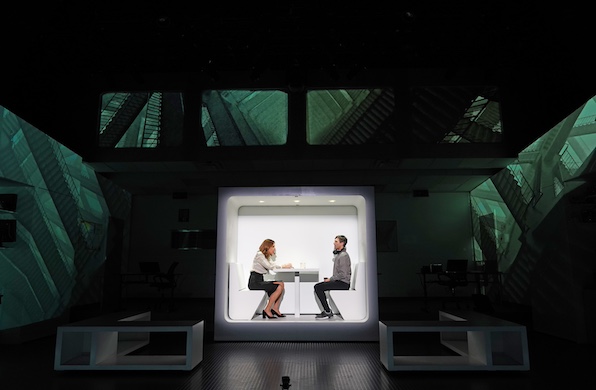Plenty of Politics in ‘Russian Troll Farm,’ as the Title Suggests, but Comedy Plays a Part as Well
Now having its off-Broadway premiere, Sarah Gancher’s play is inspired by her research in the wake of our 2016 election. The action unfolds that year at the Internet Research Agency, a real organization based at St. Petersburg.

Every profession invites politics in some form, as does each office space, but plays about people making a living don’t get more literally or transparently political than Sarah Gancher’s “Russian Troll Form: A Workplace Comedy,” now having its off-Broadway premiere.
Inspired by Ms. Gancher’s research in the wake of our 2016 election, “Russian Troll Farm” unfolds between May and November of that year at the Internet Research Agency, a real organization based at St. Petersburg that, according to the playwright, had been crafting fake accounts, writing fake news, and creating “some truly stupid memes” as far back as 2013. Its employees truly stepped their game, Ms. Gancher proposes in a playbill note, when a chap named Donald J. Trump first ran for president on the Republican ticket.
“In 2016,” she writes, Russia’s IRA “amplified support for Trump online, tried to make [Hillary] Clinton look like damaged goods, to enrage Bernie [Sanders] voters, to support Jill Stein, to suppress Black turnout, etc.” The agency’s shenanigans “were a mere drop in the bucket of all online political activity” that year, she allows, but insists “their posts were so well-targeted and strategic that they probably swung the election.”
Granted, the subtitle of Ms. Gancher’s play contains the word “comedy,” and it’s a credit to her flair in that arena that you needn’t share her theories on recent history to find her work entertaining, at least initially. “Russian Troll Farm” introduces us to a group of IRA employees in their 30s and 40s; most have Russian names but all speak in unaccented English, and all, in one way or another, suggest symptoms of arrested adolescence that will feel familiar to American audiences.

Masha, the sole woman in her unit, is a former journalist with a keen eye for married men but no particular career path in mind. Egor is drily anti-social and slavishly devoted to his job, though his dedication is born less of patriotism than a desire to beat his own records and win prizes. Team supervisor Nikolai, who wants to be a screenwriter, is married — to an oligarch’s daughter — so he immediately lands on Masha’s radar.
Then there’s Steve, who boasts the most Western-sounding name and suggests a character Jack Black might have played on screen two decades ago, but more aggressively obnoxious and vaguely sinister. Played by a hilarious John Lavelle, he barrels onstage after flushing a toilet and proceeds to shout down everyone, when not making inappropriate remarks to Masha.
This motley crew is ruled with an iron fist by an older woman named Ljuba, portrayed with characteristic elegance and wit by stage and screen veteran Christine Lahti. “You’re everything she hates about the New Russia,” Steve tells the relatively fragile and uncommitted Nikolai, referencing their superior. “She’s Soviet to her core. Forced to hire this … human latte, this performative bookstore tote bag … I know you’re more! But Ljuba won’t rest till she destroys you.”
Ljuba will emerge as a more complex figure, though, and she’s hardly the most destructive force in the play, which is divided into four parts, all contained in a single act, and shape-shifts into something of a thriller before it has run its course. In the first half, Ljuba’s charges manufacture outrageous tweets — most of them replicated from the work of actual Russian trolls, by Ms. Gancher’s account — at a dizzying place, literally bouncing in their chairs as they try to ensure Mrs. Clinton’s doom.
The tweets don’t stop altogether after that, but the tone changes; new alliances form, one bent on sabotage within. There’s a long, sober monologue in which Ljuba details a harrowing back story, and while Ms. Lahti delivers it beautifully, it’s an obvious setup for what follows: The boss lady is revealed as a misunderstood woman who has used her wits to overcome adversity — a woman, in other words, not unlike a certain Democratic candidate of several years ago, at least as she is seen by admirers.
Director Darko Tresnjak manages to keep the action brisk, and the performances remain compelling, from Renata Friedman’s wry, vaguely melancholy Masha to Haskell King’s delectably snarky Egor. Alexander Dodge’s high-tech set design and Marcus Doshi’s lighting sustain an atmosphere of blistering tension through much of the show.
Just before the tension finally lifts, Masha and Ljuba bond while watching Mrs. Clinton and Mr. Trump debate. “This stupid, vain little kulak,” Ljuba mutters, using the old Russian word for “peasant” to describe the latter. She wistfully adds, of his opponent, “A woman like that never wins.” While wearing its politics on its sleeve, in funny and solemn moments alike, “Russian Troll Farm” doesn’t contradict her.

